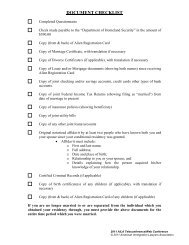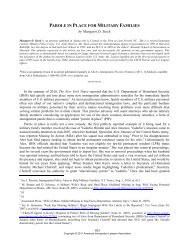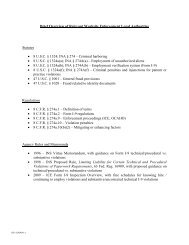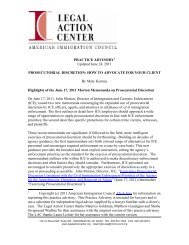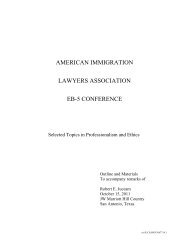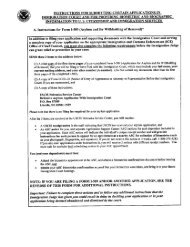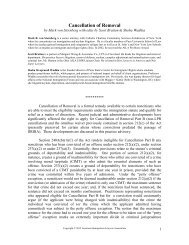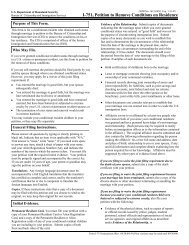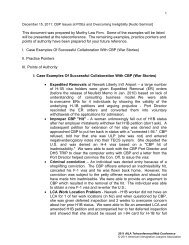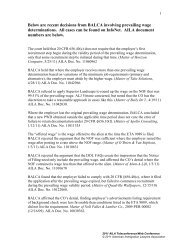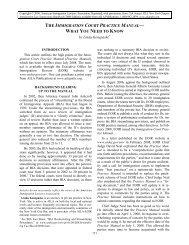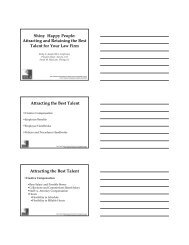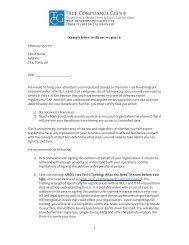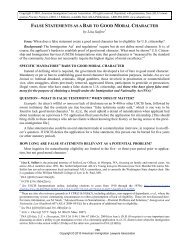Resources for 04-26-11 Seminar - AILA webCLE
Resources for 04-26-11 Seminar - AILA webCLE
Resources for 04-26-11 Seminar - AILA webCLE
You also want an ePaper? Increase the reach of your titles
YUMPU automatically turns print PDFs into web optimized ePapers that Google loves.
WAC 07 277 53214Page 3In<strong>for</strong>mation Technology Association ofAmerica, and the United States National Chamber ofCommerce.On May 22, 2008, counsel appeared in person be<strong>for</strong>e the AAO to present legal argument on behalf of thepetitioner. 2 During the oral presentation, Mr. Austin Fragomen first addressed the question of whetherwas doing business, Mr. Owen Cooper then discussed the standard <strong>for</strong> evaluating specialized knowledge andhow the director allegedly deviated from that standard, and finally Mr. Fragomen argued that the beneficiaryof the current petition met the standard <strong>for</strong> specialized knowledge. Mr. John Carter, though present, did notparticipate in the oral presentation.During the presentation, counsel noted the multiple amicI curiae briefs that had been submitted andemphasized that the "unreasonable standard" <strong>for</strong> specialized knowledge that had been applied in this case wasof critical importance <strong>for</strong> multinational corporations and L-IB professionals. While counsel attributed thedirector's decision and the recent scrutiny of L-IB petitions to the L-l Visa Re<strong>for</strong>m Act of 20<strong>04</strong>, counselasserted that the law did not apply to this case. Counsel concluded by requesting that the AAO withdraw thedecision ofthe director and approve the petition.To establish eligibility <strong>for</strong> the L-1 nonimmigrant visa classification, the petitioner must meet the criteriaoutlined in section 101(a)(15)(L) ofthe Act. Specifically, a qualifying organization must have employed thebeneficiary in a qualifying managerial or executive capacity, or in a specialized knowledge capacity, <strong>for</strong> onecontinuous year within three years preceding the beneficiary's application <strong>for</strong> admission into the UnitedStates. In addition, the beneficiary must seek to enter the United States temporarily to continue rendering hisor her services to the same employer or a subsidiary or affiliate thereof in a managerial, executive, orspecialized knowledge capacity.The regulation at 8 C.F.R. § 214.2(1)(3) further states that an individual petition filed on Form 1-129 shall beaccompanied by:(i)(ii)(iii)Evidence that the petitioner and the organization which employed or will employ thealien are qualifying organizations as defined in paragraph (l)(1)(ii)(G) ofthis section.Evidence that the alien will be employed in an executive, managerial, or specializedknowledge capacity, including a detailed description ofthe services to be per<strong>for</strong>med.Evidence that the alien has at least one continuous year of full-time employmentabroad with a qualifying organization within the three years preceding the filing ofthe petition.2 The AAO originally denied Mr. Carter's request <strong>for</strong> oral argument after he failed to show cause <strong>for</strong> why oralargument is necessary. See 8 C.F.R. § 103.3(b). After Mr. Fragomen protested directly to the ActingDirector ofD.S. Citizenship and Immigration Services (USCIS), and USCIS Chief Counsel suggested that theoral argument should be permitted, the AAO agreed to request counsel's appearance pursuant to 8 C.F.R.§ 103.2(b)(9).



